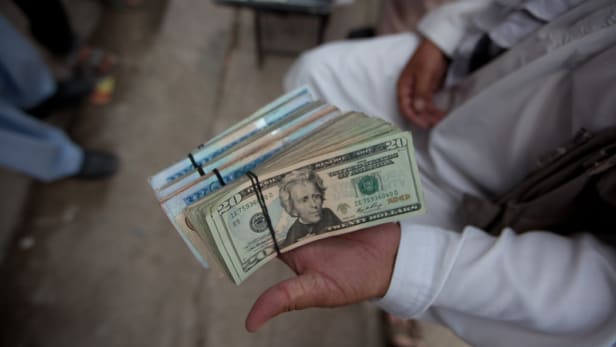By Elisabeth Rhyne
 |
| A money changer shows wads of cash. Photo by: Institute for Money, Technology and Financial Inclusion / CC BY-SA |
In his proposed budget, U.S. President Donald Trump is calling for cuts to foreign assistance. In this message I would like to suggest that even with a smaller foreign aid budget, an excellent opportunity exists to work toward financial inclusion as a development goal. Financial inclusion provides wins all around: for business, for national security and for individuals — and it would not be expensive for the administration to pursue it.
Financial inclusion means ensuring that everyone — farmers, shopkeepers, teachers, students, etc. — has quality financial services to manage their lives and become economically productive. Over 2 billion adults worldwide lack a bank account. Financial services, including accounts, savings and credit, have become a gateway for social and economical inclusion, which in turn contributes to prosperity and peace. For the first time in history, financial inclusion is actually feasible: mobile money, e-commerce and digital financial services make it possible for providers to serve enormous new segments of the population.
Financial inclusion could unite a wonderful array of U.S. resources around a common aim. As a dominant player in the world’s financial system, the U.S.’s actions already shape the path of global financial inclusion. American financial institutions are globally preeminent, from banks such as CitiBank and JPMorgan Chase to payments providers such as Visa, MasterCard and PayPal. The American financial technology industry creates new ways for financial services to reach people, and American impact investors finance them. U.S. regulatory decisions ripple around the world.
If these actors worked together under a U.S. government umbrella, they could create a financially inclusive world.
The three goals of a financial inclusion agenda
A U.S. financial inclusion agenda should be organized around three challenges: reaching everyone with financial services (access); ensuring that financial services matter to lives and economies (meaningful inclusion); and ensuring that newly included customers are informed and protected. Access is step one, but steps two and three are equally important. The U.S. Department of the Treasury is the natural lead, with supporting roles for the State Department, U.S. Agency for International Development and the Overseas Private Investment Corporation.
1. Universal financial access
Financial access is about creating the infrastructure to connect everyone: payment systems, credit bureaus, and national ID systems. Often, such initiatives are executed through public-private partnerships. The U.S. private sector has the know-how, and U.S. development assistance can add support.
A rapid way to include new customers is to digitize government-to-person (G2P) payments, which also reduces fraud and saves delivery costs. Humanitarian and disaster assistance should be paid electronically, and the U.S. can support developing countries to switch to digital G2P.
Regulatory policy must move in step. The U.S. can energetically support the G20’s financial inclusion agenda, and it should ensure that the Basel Committee produces regulatory guidance that opens the way to inclusion. Across developing countries, we see regulators who want to promote inclusion but may actually hinder it, because they are uncomfortable with new technologies or interpret Basel guidance too narrowly. A particular challenge is to create effective anti-money laundering and anti-terrorist financing (AML/CFT) protocols that do not exclude lower income consumers, using national IDs and tiered know-your-customer policies. By making financial flows more visible, financial inclusion makes it harder to finance terrorism.
2. Meaningful inclusion: Providing value and reaching the most excluded
Access to finance only sparks economic growth if the services address key economic needs. Fortunately, an enormous burst of fintech innovation and impact investing is leading to creative new products. A grand challenge to these actors could encourage innovations with life-changing potential, such as health insurance, pay-as-you-go financing for clean energy or innovations for small farmers and small businesses — such as e-commerce, marketplace lending or distributor-based finance.
For truly meaningful inclusion, special attention is needed to address the deficit in women’s access and to ensure that disadvantaged groups are reached, including people in remote areas, ethnic minorities, persons with disabilities and older people. Smaller countries may also be overlooked.
3. Consumer protection and financial education
A rapid influx of inexperienced consumers could be put at risk unless consumers benefit from protections and assistance in navigating the financial system. The U.S. can help regulators implement consumer protections and create effective financial capability-building programs. For example, Smart Campaign Certification is a voluntary program for financial institutions to demonstrate high consumer protection standards. The U.S. should require the financial services providers it assists to get certified. Financial education is also needed, so the newly included will become savvy consumers. In these areas, the U.S. has exceptionally important expertise.
Finally, given that the financial well-being of consumers and small businesses is an aim of financial inclusion, policymakers should measure the financial health of their citizens, as the Center for Financial Services Innovation has done for Americans. The U.S. has its own domestic financial inclusion challenges, including the precarious financial health of many Americans, and it has a dynamic domestic financial inclusion community, which is increasingly in touch with its international counterparts. The administration can empower exchanges, which would support both domestic and international aims.

No comments:
Post a Comment